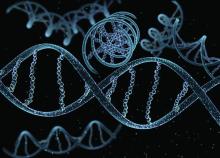The U.S. Preventive Services Task Force (USPSTF) has updated its recommendations on assessment of breast cancer susceptibility gene (BRCA)-related cancer, substantially expanding the pool of individuals for whom risk assessment, testing, and counseling would be warranted.
In its 2013 recommendation, the USPSTF said referral for genetic counseling and evaluation for BRCA1/2 testing was warranted for women who had a family history linked to increased risk of potentially harmful BRCA1/2 mutations.
The updated recommendations, just published in JAMA, expand the screening-eligible population to include those with personal cancer history, and more specifically call out ancestry linked to BRCA1/2 mutations as a risk factor (JAMA. 2019;322[7]:652-65. doi: 10.1001/jama.2019.10987).
“The USPSTF recommends that primary care clinicians assess women with a personal or family history of breast, ovarian, tubal, or peritoneal cancer or who have an ancestry associated with BRCA1/2 gene mutations with an appropriate brief familial risk assessment tool,” wrote Douglas K. Owens, MD, of Stanford (Calif.) University, and coauthors of the task force report.
Positive results on the risk assessment tool should prompt genetic counseling, and genetic testing if indicated after counseling, the USPSTF added in its statement.
By contrast, the task force recommends against routine assessment, counseling, and testing in women with no family history, personal history, or ancestry linked to possibly harmful BRCA1/2 gene mutations, consistent with their previous recommendation.
Mutations of BRCA1/2 genes occur in an estimated 1 in 300-500 women in the general population, and account for 15% of ovarian cancer and up to 10% of breast cancer cases, according to the USPSTF.
Breast cancer risk is increased up to 65% by 70 years in those women with clinically significant BRCA1/2 mutations, while risk of ovarian, fallopian tube, or peritoneal cancer are increased by up to 39%, according to studies cited by the USPSTF.
Important step forward
Including women with prior breast and ovarian cancer in the screening-eligible population is an “important step forward,” Susan Domcheck, MD, and Mark Robson, MD, said in a related editorial.
“While further expansion of the USPSTF recommendation should be considered, the importance is clear: Identification of individuals at risk of carrying a BRCA1/2 mutation can be lifesaving and should be a part of routine medical care,” Dr. Domcheck and Dr. Robson said in their editorial, which appears in JAMA.
While the updated recommendations explicitly call out ancestry as a risk factor, they stop short of endorsing testing for unaffected Ashkenazi Jewish women with no family history, the authors said.
“However, the statement may be interpreted as a step toward supporting unselected testing in this group,” they added.
Among unselected individuals of Ashkenazi Jewish descent, 1 in 40 have 1 of 3 specific BRCA1 or BRCA2 founder mutations, according to one study cited by Dr. Domcheck and Dr. Robson.
More research needed
Current research is still “limited or lacking” to address many key questions about the benefits and harms of risk assessment, genetic counseling, and genetic testing in women without BRCA1/2-related cancer, according to authors of a literature review used by the USPSTF.


